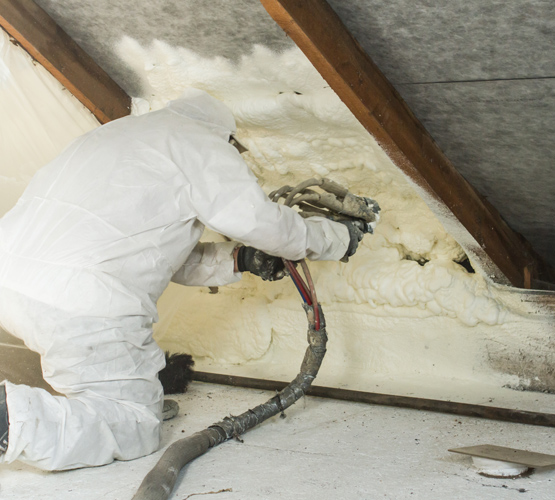Lenders Continue to Reject Homes with Spray Foam Insulation
According to a recent report by the BBC, homeowners continue to face issues when it comes to buying, selling or remortgaging a property with spray foam insulation, with lenders unwilling to approve mortgages for properties where it is present. It is estimated as many as 250,000 homes in the UK have this type of insulation, with much of it installed under the previous government’s Green Homes Grant scheme, a scheme which enabled homeowners to receive part funding for new energy efficiency measures.

What is Spray Foam Insulation?
Spray foam insulation is a liquid foam that installers apply using a spray gun in the area they want to insulate, and as it sets, it forms an insulating layer.
This fast-acting liquid can be applied quickly, even in tricky areas that may be more complicated or time-consuming to insulate with solid materials. It can be used to insulate various parts of a building, including the roof, walls, floors, lofts, and more.
It can be viewed by many homeowners as an easy fix to prevent heat escaping their property, particularly in the last couple of years with energy bills going up. However, homeowners are now being advised to seek independent advise or even avoid getting any installed.
The Problem with Spray Foam Insulation
Spray Foam Insulation has been used in properties for decades, particularly in lofts and roofs, however, there is evidence to suggest that this type of insulation has strong links to trapped moisture, poor ventilation and timber decay if used inappropriately or installed incorrectly.
Lenders are increasingly concerned that, if spray foam insulation is not installed in line with manufacturer recommendations, it could compromise the roof structure, leading to costly repairs. In some cases, removal of the insulation may be required, which could cost anywhere upwards of £3,000. Homeowners are strongly advised to use reputable and certified installers when considering spray foam insulation. However, despite this precaution, lenders may still insist on complete removal of the insulation and structural surveys before agreeing to lend on a property.
In addition, some mortgage lenders are agreeing to lend on a property with spray foam insulation, but only where detailed warranties or structural reports are present—documents that are not easy for homeowners to come by. This has resulted in many property sales falling through, with some homeowners forced to take on the expense of removing the insulation or significantly reducing the property’s asking price to attract buyers.
Advice for Homeowners
As a result of UK lender’s general reluctance to deal with homes with spray foam insulation, as well as issues with potential rogue spray foam operators and removal firms; the Home Owners Alliance is advising that homeowners avoid installing spray foam installation for the time being, until there is greater support and governance in this area.
Homeowners considering spray foam insulation are strongly advised to obtain all relevant documentation, including a product certificate, installer warranty, before-and-after photographs, a survey report, and a product warranty. Reputable installers will always conduct a thorough survey before starting any work to confirm that spray foam insulation is suitable for the property and unlikely to cause any structural damage.
The right measures in the right homes
Elmhurst’s Retrofit Support Manager, Steve Marriott, explains why some of the issues outlined with Spray Foam Insulation could have (and still can be) avoided, with the adoption of a quality retrofit process:
“PAS 2035 was introduced in 2019, outlining the requirements for improving and insulating homes correctly using a whole-house approach to retrofit. The standard also established the need for competent and qualified retrofit professionals to assess individual properties and oversee the proper installation of energy efficiency measures.
Had the Green Homes Grant Voucher Scheme back in 2022 mandated the involvement of Retrofit Assessors and Retrofit Coordinators, homeowners would have been better protected and more informed when selecting energy improvement measures for their properties. For example, in such a scenario, a Retrofit Coordinator working alongside a Retrofit Assessor could have evaluated a property’s condition, recommended appropriate solutions, overseen quality to prevent issues like moisture build-up, and managed communication and documentation to address concerns raised by homeowners and mortgage providers.
Fortunately the government funded schemes that are in place do mandate the use of PAS 2035 and the requirement for Retrofit professionals”.
Find a Retrofit Professional
Search locally or nationwide for Elmhurst accredited Retrofit Assessors and Coordinators by using
SEARCH NOW >
